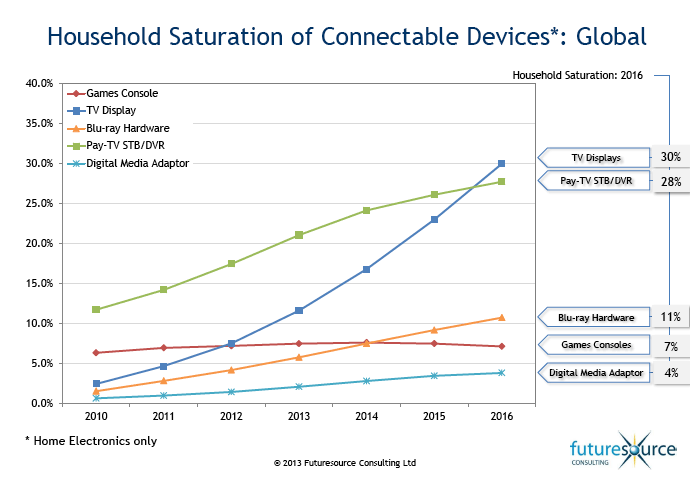By Simon Bryant, Head of Consumer Electronics, Futuresource Consulting
Connectivity is rapidly becoming a standard feature across all consumer electronics products and is having a huge impact upon the way that people access content at home and on the move. Due to its inclusion in traditional AV devices such as TVs and Blu-ray players – and the skyrocketing global demand for smartphones and tablets – Futuresource research shows that the installed base of connected CE devices could be close to three billion units at the end of 2012 when final numbers are in, rising to 5.7 billion by 2016.
This growth in connected device ownership is not confined to developed markets. Moreover, several emerging markets are experiencing growth in certain product categories which is outstripping that of more established regions. Some examples of this include tablet and smartphone sales in Brazil and India, with growth rates exceeding those in developed markets, though from a far lower level of personal penetration. Smart TV growth in China is also flourishing, driven by the ability of consumers to access free online movie content; growth here is outpacing demand in the USA, where the main premium entertainment cable providers are adapting their strategies to meet the challenge of the internet.
Smart TV is currently creating a lot of buzz around the industry, as the devices are integrating into a multi-platform offering alongside smartphones, tablets and PCs. For the CE vendors, the TV is now starting to emerge as the main strategic focus and the main hub for connected content in the home. As margins in the TV display market continue to shrink, Smart TV offers opportunities to differentiate through software, generate ongoing revenue via content subscription services and also strengthen brand loyalty. Connectivity rates for Smart TVs are close to 50% and rising, especially as embedded Wireless-N becomes standard and more compelling content is added, though hardware suppliers have struggled to generate any significant revenue streams to date, as the vast majority of available content is free and/or ad-funded.
Leadership in Smart TV innovation goes a long way towards driving share and price premium, as demonstrated by Samsung, which continues to increase its dominance, as well as building an ecosystem around its products with a suite of apps and content deals.
Looking to the global smartphone market, uptake continues to power forward, achieving nearly 480 million units in 2011 and with over 40% growth anticipated for 2012 once the final numbers are in. Personal penetration in a number of developed markets will exceed 50% in 2012 – and as much as 70% in the UK – as the devices become an increasingly important tool in the wider population’s everyday life. In terms of operating systems, Google’s Android OS continues to grow at a rapid pace and has been a vital contributor to the strong performance of the overall smartphone market over the last three years. By the end of 2012, Android is expected to account for more than 60% of the total smartphone market, up from 46% in 2011, though Apple’s sustained iPhone growth also continues to impact the market.
Tablets have witnessed meteoric growth since 2010, with global sales expected to far exceed 110m units in 2012, with the USA leading the charge at around 40% of US consumers owning a tablet by 2016; the UK ownership level will be close behind the USA.
Looking at current tablet owners, media usage is high, which is creating a major value-added opportunity for content producers, pay-TV providers, broadcasters and games publishers. In addition, tablets are unlikely to widely displace primary large-screen TV sets, which offer group viewing in high definition and 3D. As an added opportunity for the industry, a key tablet application will be to play out content from tablets to TV screens. Tablets are also being increasingly used in conjunction with connected TVs as advanced remote controls.



